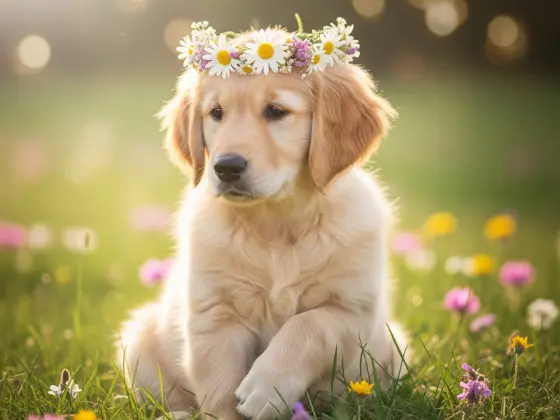Golden Retrievers in Hunting and Field Work
Golden Retrievers in Hunting and Field Work, When most people picture a Golden Retriever, they imagine a goofy, ball-obsessed family dog. And honestly, that’s true — they’re champions at stealing socks, chasing tennis balls, and leaning their entire 70-pound body against you like a living weighted blanket. But here’s the thing: Goldens weren’t originally bred just to be your Netflix-snuggling bestie.
They were bred to work. Specifically, to retrieve game for hunters in the Scottish Highlands. That’s right — your couch-loving Golden has centuries of field-dog heritage in their DNA. And if you’ve ever seen the way their ears perk up at the sound of a bird or how they’ll dive headfirst into a pond after a stick, you’ve seen glimpses of that history.
So let’s dig into the story of Golden Retrievers as hunting and field dogs — from their origins, to how they’re trained, to what it looks like when modern Goldens hit the fields.
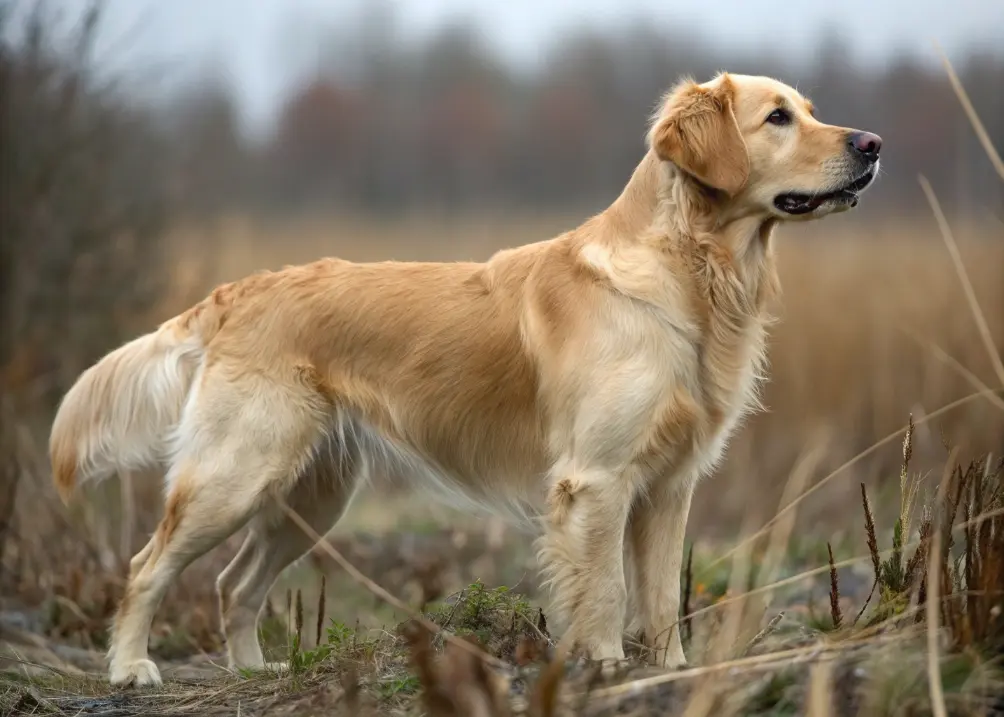
1. A Quick History: Why Goldens Were Bred
Golden Retrievers in hunting and field work this story starts in the mid-1800s in Scotland. Sir Dudley Marjoribanks (later Lord Tweedmouth) wanted the perfect gundog. The hunting environment in Scotland was tricky: marshy lands, rivers, and misty fields where game often fell into water or dense cover.
He needed a dog that could:
- Retrieve shot birds on land and water.
- Work in cold, damp conditions.
- Be gentle-mouthed (so the game wasn’t damaged).
- Trainable and eager to please.
By crossing a now-extinct yellow Wavy-Coated Retriever with the Tweed Water Spaniel, and later adding Irish Setter and Bloodhound lines, the Golden Retriever was born.
Fun fact: The Golden was officially recognized as a distinct breed by The Kennel Club (UK) in 1911. In the U.S., the American Kennel Club recognized them in 1925.
From day one, their purpose was clear: to be hunting partners with incredible stamina, intelligence, and that soft “retriever” mouth.
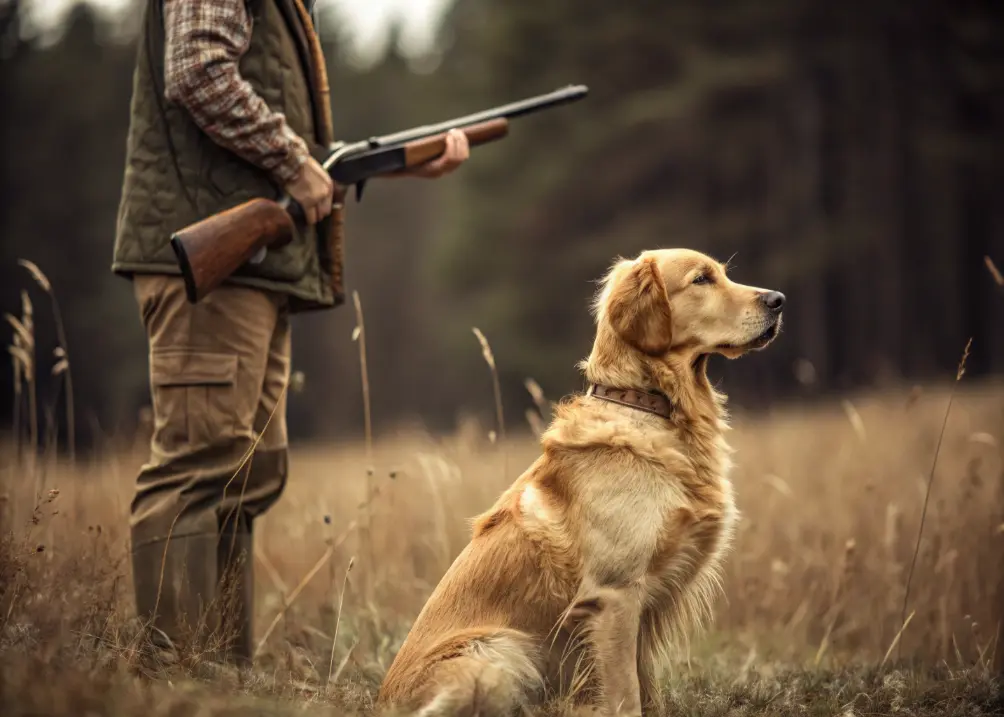
2. Natural Instincts: Why Goldens Shine in the Field
Even if your Golden has never stepped foot near a hunting field, their instincts show up in everyday life:
- Bringing you random objects (shoes, toys, socks).
- Carrying things carefully in their mouths.
- Jumping into lakes like they were born for it.
These behaviors aren’t accidents — they’re echoes of centuries of selective breeding of Golden Retrievers in hunting and field work.
What makes them especially good at hunting and field work?
- “Soft mouth”: Goldens naturally carry things without biting down hard. Hunters love this because it means retrieving birds without damage.
- Love of water: That thick, water-resistant double coat makes them excellent swimmers.
- High energy & stamina: They were bred to work long days outdoors.
- Trainability: Ranked 4th most intelligent breed by Stanley Coren, Goldens are eager learners.
Basically, Goldens are like the friend who’s always down to help you move — tireless, cheerful, and dependable.
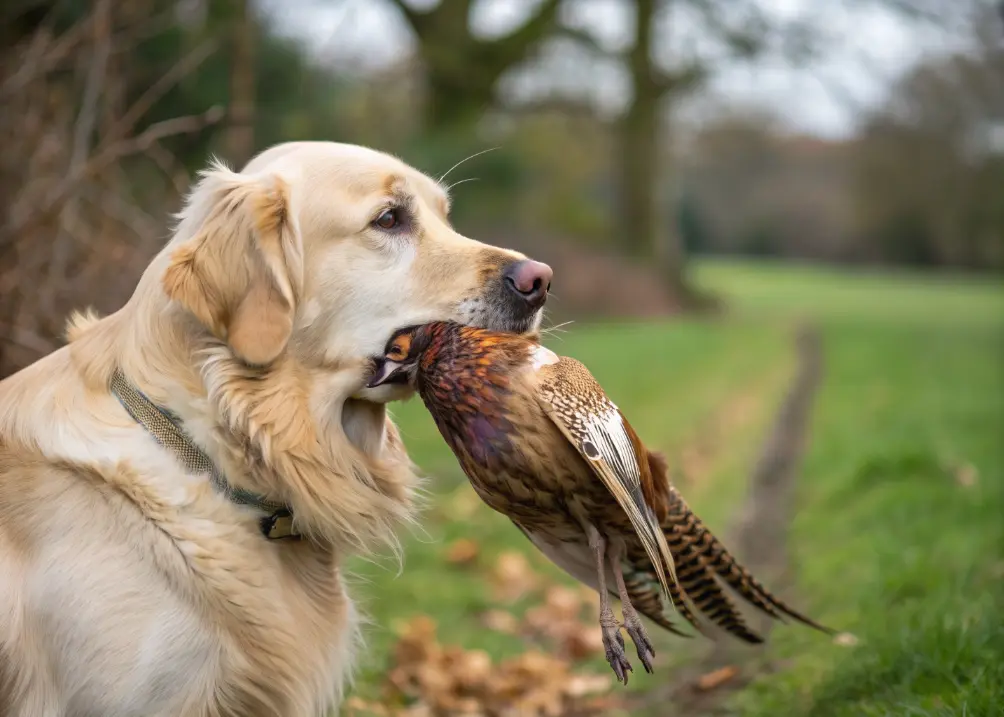
3. Training a Golden for Hunting
Golden Retrievers in hunting and field work don’t just magically know what to do. Their instincts help, but training shapes them into reliable partners.
Typical training steps:
- Basic obedience: Sit, stay, come — these are non-negotiables.
- Retrieving games: Start with toys, then dummies, then move to feathers or bird wings.
- Introduction to water: Teaching them to retrieve in ponds or rivers.
- Gun acclimation: Dogs are gradually introduced to gunshot sounds so they don’t spook.
- Field trials/tests: Some Goldens participate in organized competitions to prove their hunting ability.
Golden owners often say training is half about the dog, half about the human’s patience. And if you’ve ever tried convincing a Golden not to chase squirrels mid-walk, you know they’ve got big energy.
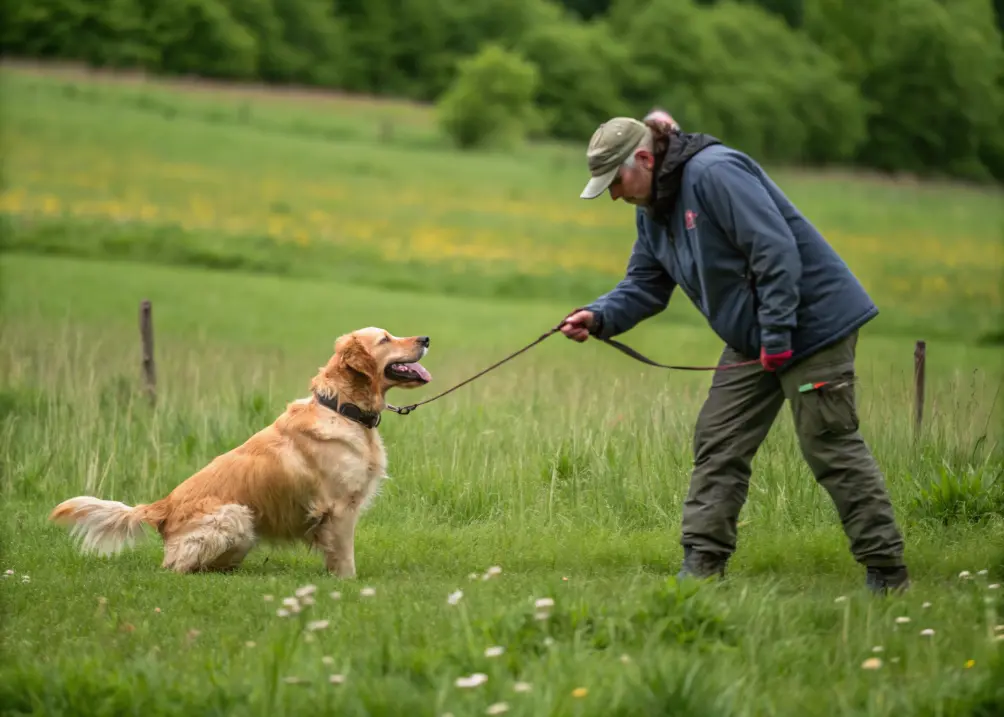
4. Modern Hunting with Golden Retrievers
While not as common as Labradors in hunting circles today, plenty of hunters still work with Goldens. They’re especially popular for:
- Waterfowl hunting: Ducks, geese.
- Upland game hunting: Pheasants, quail, grouse.
Golden Retrievers might not be as “hard-driving” as some Labs, but hunters often describe them as steady, reliable, and less likely to be reckless. They’ll happily plunge into icy water, wait patiently in blinds, and retrieve multiple birds during a hunt.
Interesting stat: According to the AKC, hunting-bred Goldens often come from different lines than show-bred ones. Field-bred Goldens usually have darker coats, slimmer builds, and higher energy.
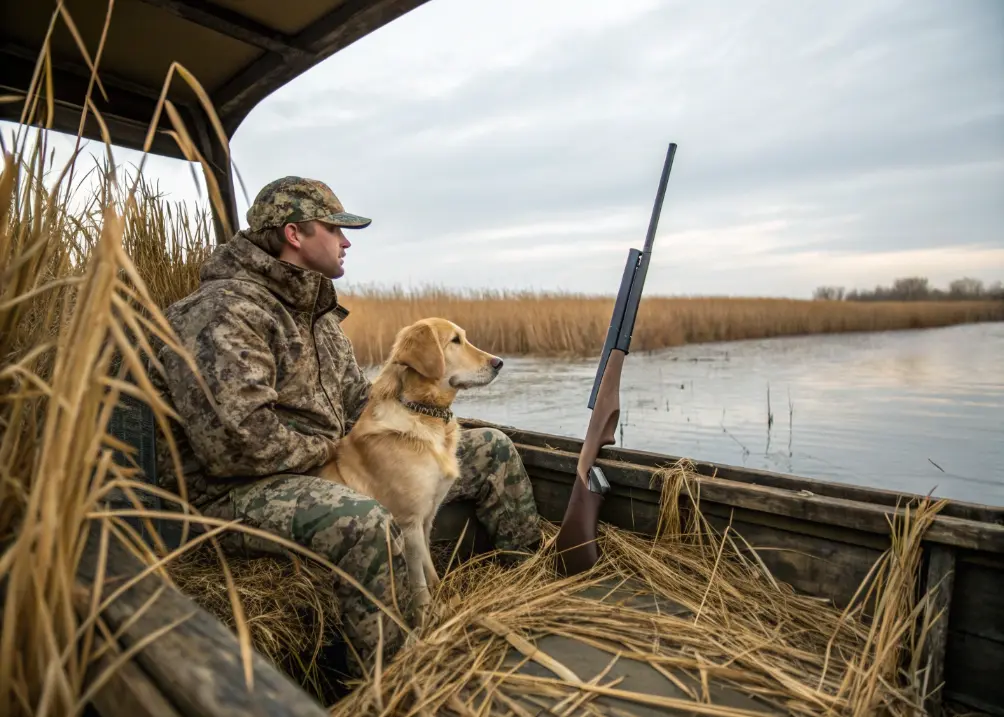
5. Golden Retrievers in Field Trials and Hunt Tests
Even if you’re not a hunter, field trials and hunt tests show off what Goldens can do.
- Field trials: Competitive events where retrievers show their skills in marked retrieves, blind retrieves, and multiple distractions.
- Hunt tests: Non-competitive pass/fail evaluations of a dog’s hunting ability.
Goldens are frequent participants, proving they’re more than just pretty faces. Watching one of these trials is like watching an athlete in their element — focus, speed, and precision.
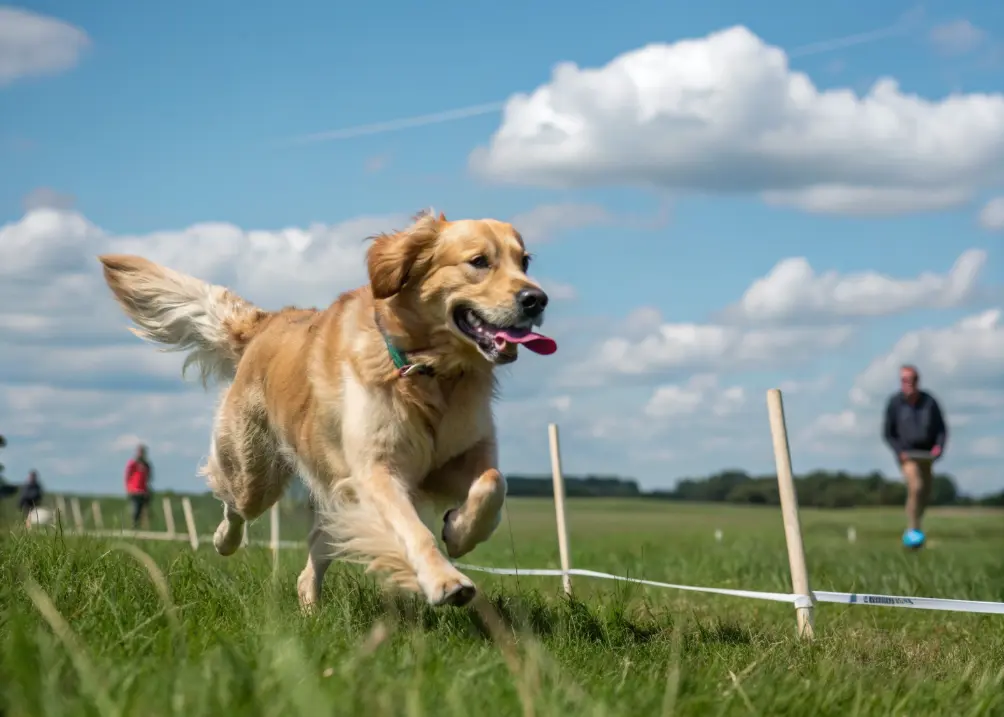
6. Stories from the Field
Hunters often talk about the bond formed with a retriever in the field. Here are a few common anecdotes:
- A Golden patiently waiting hours in freezing temperatures, then springing into action the second a bird is down.
- Dogs who get so excited retrieving that they’ll try to bring back sticks, hats, even decoys.
- Families who say their Golden switches from goofy house pet to laser-focused worker the moment they see hunting gear.
It’s that dual personality — silly clown at home, serious partner in the field — that makes Goldens unforgettable.
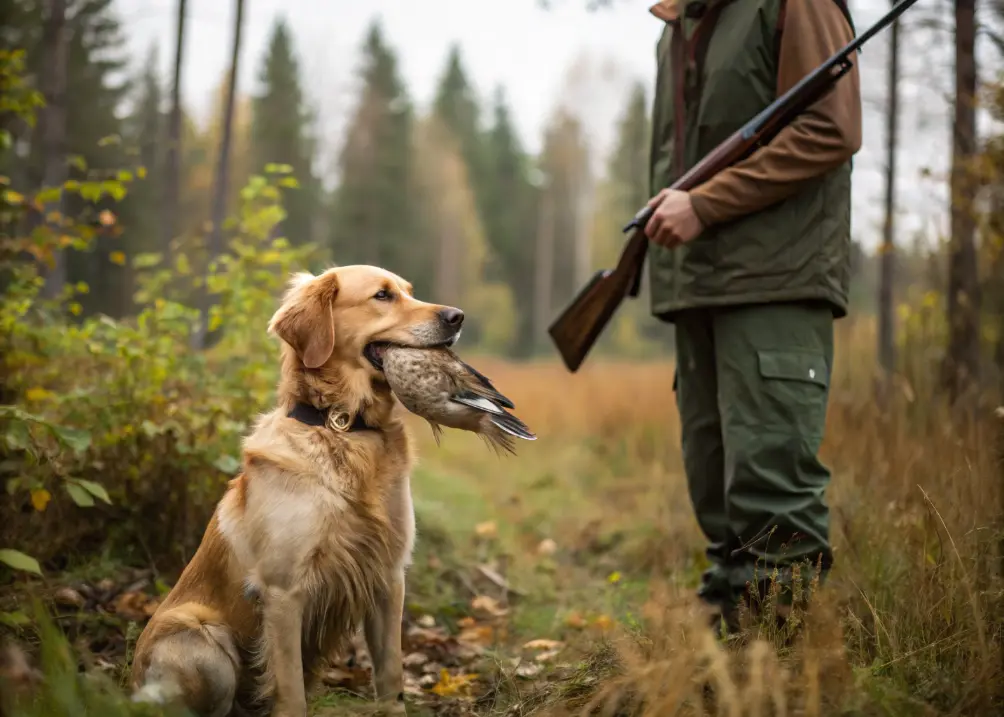
7. Challenges with Goldens in Hunting
Goldens aren’t perfect hunting dogs. Some common challenges:
- Energy level: Without enough training and outlets, their enthusiasm can turn chaotic.
- Heat sensitivity: Their thick coats can cause overheating in hot climates.
- Show vs. field lines: Not all Goldens are bred for hunting anymore. Some are more suited for couches than duck blinds.
But for hunters who are patient and consistent, these challenges are far outweighed by their loyalty and natural skills.
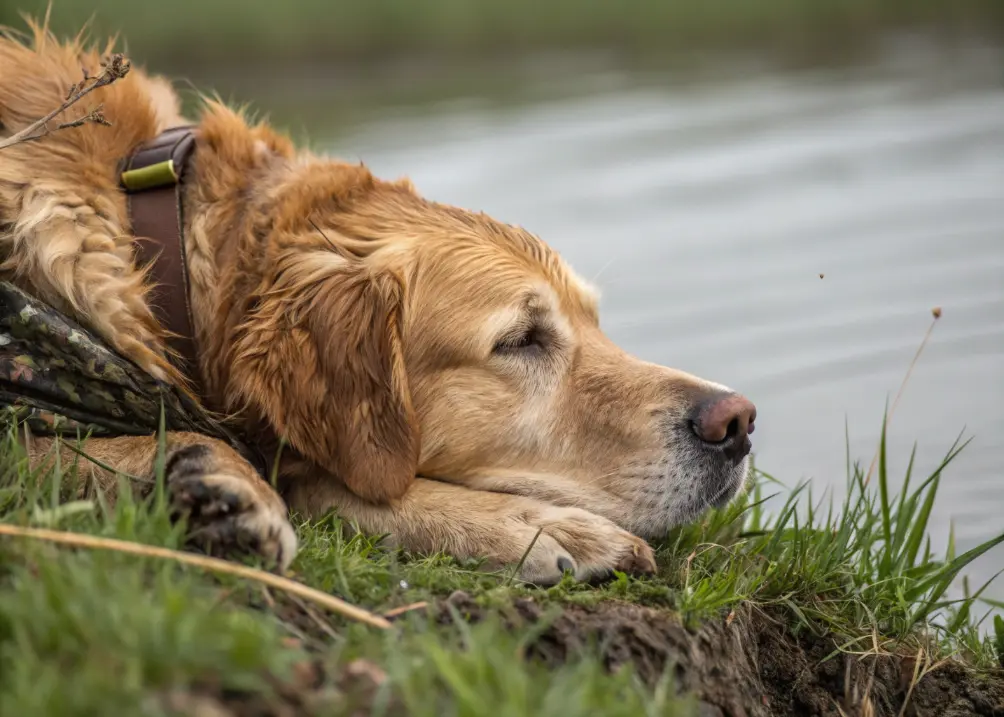
8. Goldens Beyond Hunting: Search, Rescue & Therapy
Their hunting roots also explain why Goldens excel in other jobs today:
- Search and rescue: That nose and stamina make them lifesavers in disaster zones.
- Service/therapy dogs: Their trainability and gentle mouth carry over to helping humans.
- Detection dogs: Goldens have been trained for sniffing out contraband or even medical issues.
From birds to bomb-sniffing — their versatility is unmatched.
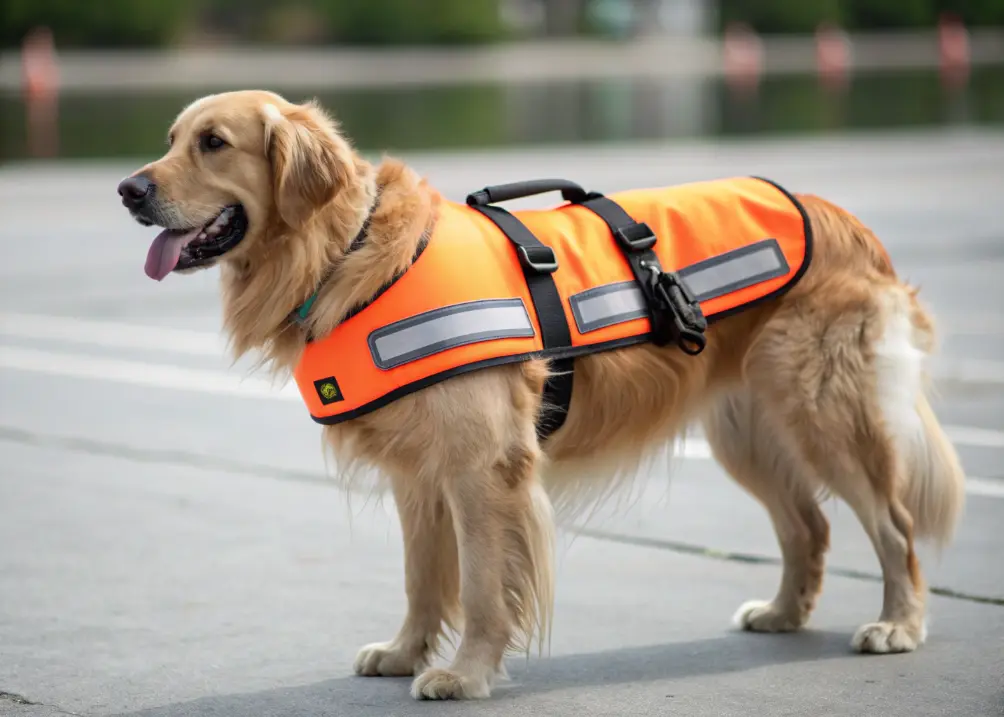
FAQs About Golden Retrievers in Hunting
What’s the difference between field-bred and show-bred Goldens?
Field-bred are leaner, darker, higher energy. Show-bred are stockier, lighter-colored, calmer.
Can a pet-bred Golden learn to hunt?
Yes, but it may take more training and patience compared to field-line dogs.
Do Goldens enjoy hunting?
Most love it. Retrieving and swimming come naturally to them.
How old should a Golden be before hunting training?
Start obedience and retrieving games as puppies, but formal hunting training usually begins around 6–12 months.
Are Goldens better for ducks or upland hunting?
They can do both, though they really shine in waterfowl hunts thanks to their coat and swimming ability.
Do they handle cold water well?
Yes, their double coat insulates them. But hunters still monitor for hypothermia.
How long can a Golden work in the field?
With good health, many hunt actively until 8–10 years old.

References
- American Kennel Club (AKC) – Golden Retriever Breed History
- The Kennel Club (UK) – Origins of the Golden Retriever
- Stanley Coren, The Intelligence of Dogs
- Ducks Unlimited – Retrievers in Waterfowl Hunting
- North American Hunting Retriever Association (NAHRA) – Hunt Tests
we have many helpful blog post about Golden Retriever, you might want to check them out.
Golden Retriever Barking Too Much? Here’s What to Do
From Pulling to Polite: Leash Training Your Golden Retriever
Health Problems in Golden Retrievers You Need to Know About






